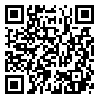Volume 9, Issue 2 (5-2025)
EBHPME 2025, 9(2): 68-77 |
Back to browse issues page
Download citation:
BibTeX | RIS | EndNote | Medlars | ProCite | Reference Manager | RefWorks
Send citation to:



BibTeX | RIS | EndNote | Medlars | ProCite | Reference Manager | RefWorks
Send citation to:
Pourmirza A H, Sadeghifar J, Azizi M, Ashraf Aivazi A, Bavir F, Najafi Ghobadi K. Relationship between Learning Styles and Academic Engagement in Medical Students: A Cross-Sectional Study. EBHPME 2025; 9 (2) :68-77
URL: http://jebhpme.ssu.ac.ir/article-1-539-en.html
URL: http://jebhpme.ssu.ac.ir/article-1-539-en.html
Amir Hossein Pourmirza 
 , Jamil Sadeghifar *
, Jamil Sadeghifar * 

 , Monireh Azizi
, Monireh Azizi 

 , Ali Ashraf Aivazi
, Ali Ashraf Aivazi 

 , Faezeh Bavir
, Faezeh Bavir 

 , Khadijeh Najafi Ghobadi
, Khadijeh Najafi Ghobadi 



 , Jamil Sadeghifar *
, Jamil Sadeghifar * 

 , Monireh Azizi
, Monireh Azizi 

 , Ali Ashraf Aivazi
, Ali Ashraf Aivazi 

 , Faezeh Bavir
, Faezeh Bavir 

 , Khadijeh Najafi Ghobadi
, Khadijeh Najafi Ghobadi 


Health and Environmental Research Center, Ilam University of Medical Sciences, Ilam, Iran , Jamil.sadeghifar@gmail.com
Abstract: (305 Views)
Background: Learning styles, as a personal and distinct approach that each person employs to understand and process information, play a significant role in academic success. On the other hand, academic engagement, which refers to the active participation of students in the educational processes, is considered one of the key indicators of academic progress. Therefore, the present study was conducted with the aim of examining the relationship between learning styles and academic engagement among medical students at Ilam University of Medical Sciences.
Methods: This descriptive-analytical and cross-sectional study was conducted in 2023 among medical students in the basic sciences and pathophysiology phases at Ilam University of Medical Sciences. All students were invited to participate in the study by census (N = 178). Ultimately, 153 students entered the study by completing the questionnaire. To collect data, the VARK learning styles questionnaire and the Holgado academic engagement questionnaire including three dimensions: Vigor, Dedication, and absorption were used. Data analysis was conducted using mean and standard deviation, chi-square, independent t-test, and Mann-Whitney test with SPSS24.
Results: The results indicated that the average score of academic engagement and its dimensions among medical students at Ilam University of Medical Sciences is at a moderate level, with the best situation related to the dimension of Dedication (13.9 ± 4.34) and the weakest situation related to the dimension of absorption (10.27 ± 3.97). Most students (30.1%) prefer the VARK learning style (quad modal), and among various single learning styles, the auditory learning style has the highest prevalence (17.6%). A significant positive correlation was observed between the scores of the dimensions of academic engagement for male and female students. The average score of the dimension of absorption among pathophysiology students was significantly higher than that of the basic sciences. (P-values ≤ 0.001). Finally, no significant difference was found between the dimensions of academic engagement and the single-style and multi-style learning preferences.
Conclusion: The results of the study indicate that academic engagement among medical students is not at a desirable level, and learning styles do not have a statistically significant relationship with the level of academic engagement. Examining the variables that influence academic engagement and striving to strengthen this key variable can have a significant impact on learning outcomes Therefore, it is recommended to pay greater attention to improving the educational environment, enhancing students` motivation, and diversifying teaching methods. Additionally, examining structural factors such as academic workload and psychological support can help strengthen academic engagement.
Methods: This descriptive-analytical and cross-sectional study was conducted in 2023 among medical students in the basic sciences and pathophysiology phases at Ilam University of Medical Sciences. All students were invited to participate in the study by census (N = 178). Ultimately, 153 students entered the study by completing the questionnaire. To collect data, the VARK learning styles questionnaire and the Holgado academic engagement questionnaire including three dimensions: Vigor, Dedication, and absorption were used. Data analysis was conducted using mean and standard deviation, chi-square, independent t-test, and Mann-Whitney test with SPSS24.
Results: The results indicated that the average score of academic engagement and its dimensions among medical students at Ilam University of Medical Sciences is at a moderate level, with the best situation related to the dimension of Dedication (13.9 ± 4.34) and the weakest situation related to the dimension of absorption (10.27 ± 3.97). Most students (30.1%) prefer the VARK learning style (quad modal), and among various single learning styles, the auditory learning style has the highest prevalence (17.6%). A significant positive correlation was observed between the scores of the dimensions of academic engagement for male and female students. The average score of the dimension of absorption among pathophysiology students was significantly higher than that of the basic sciences. (P-values ≤ 0.001). Finally, no significant difference was found between the dimensions of academic engagement and the single-style and multi-style learning preferences.
Conclusion: The results of the study indicate that academic engagement among medical students is not at a desirable level, and learning styles do not have a statistically significant relationship with the level of academic engagement. Examining the variables that influence academic engagement and striving to strengthen this key variable can have a significant impact on learning outcomes Therefore, it is recommended to pay greater attention to improving the educational environment, enhancing students` motivation, and diversifying teaching methods. Additionally, examining structural factors such as academic workload and psychological support can help strengthen academic engagement.
Type of Study: Original article |
Subject:
General
Received: 2025/01/19 | Accepted: 2025/02/27 | Published: 2025/05/20
Received: 2025/01/19 | Accepted: 2025/02/27 | Published: 2025/05/20
Send email to the article author
| Rights and permissions | |
 |
This work is licensed under a Creative Commons Attribution-NonCommercial 4.0 International License. |




